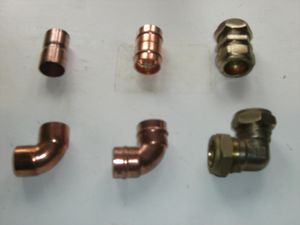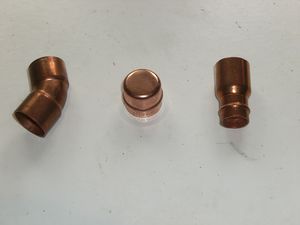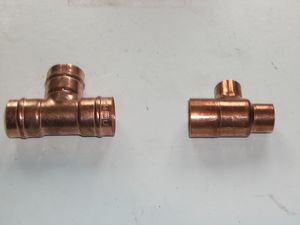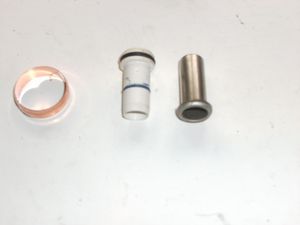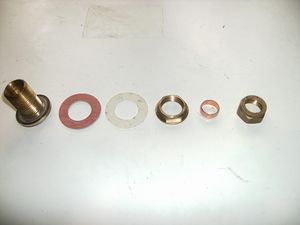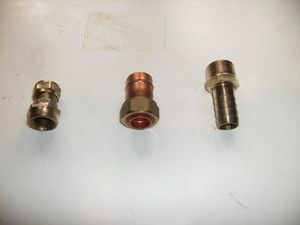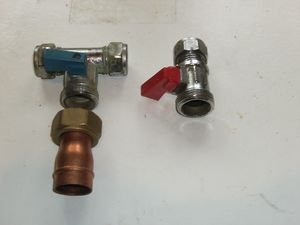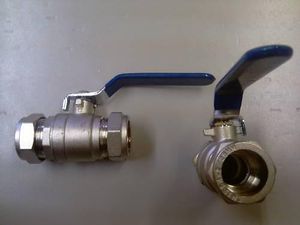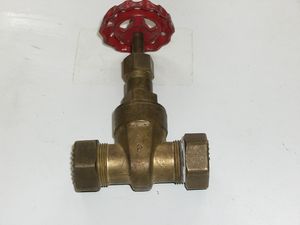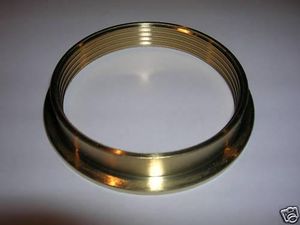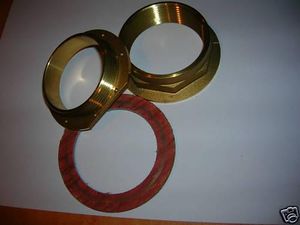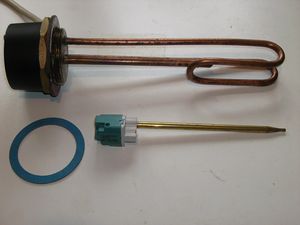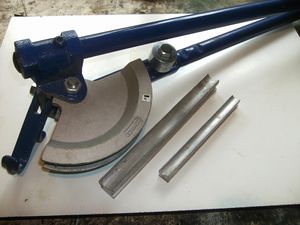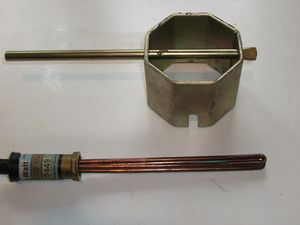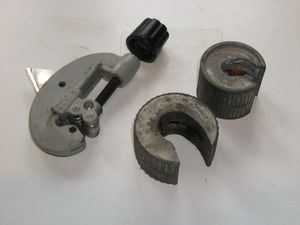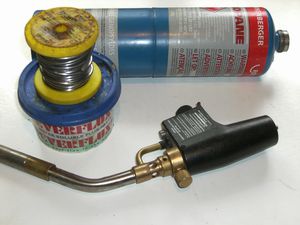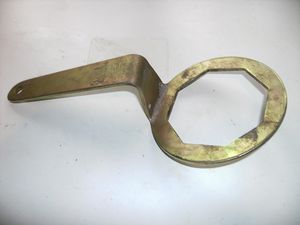Difference between revisions of "Plumbing fittings"
(→Ball valves) |
(→Gate valve) |
||
| Line 61: | Line 61: | ||
A ball valve is a valve with a spherical disc, the part of the valve which controls the flow through it. The sphere has a hole, or port, through the middle so that when the port is in line with both ends of the valve, flow will occur. When the valve is closed, the hole is perpendicular to the ends of the valve, and flow is blocked. The handle or lever will be inline with the port position letting you "see" the valve's position. | A ball valve is a valve with a spherical disc, the part of the valve which controls the flow through it. The sphere has a hole, or port, through the middle so that when the port is in line with both ends of the valve, flow will occur. When the valve is closed, the hole is perpendicular to the ends of the valve, and flow is blocked. The handle or lever will be inline with the port position letting you "see" the valve's position. | ||
| − | + | Gate valve | |
A gate valve is a valve that opens by lifting a round or rectangular gate/wedge out of the path of the fluid. | A gate valve is a valve that opens by lifting a round or rectangular gate/wedge out of the path of the fluid. | ||
Revision as of 21:23, 27 August 2011
The bit of code below assists indexing on search engines. Replace "Biodiesel new page" with a very brief description of what the page is about. Then delete this text.
A brief discription of the fittings and tools used
Contents
Fittings
Fittings are used in pipe and plumbing systems to connect straight pipe or tubing sections, to adapt to different sizes or shapes, and for other purposes There are basically two types of copper fittings,compression and capillary A compression fitting comprises of the body an olive and the nut,the nut is threaded onto the body of the fitting and tightened to make a leakproof connection. Fittings are typically made of brass There are two types of capillary - end feed/copper sweat and solder ring/integral ring joint
- Click pictures to enlarge
Elbow
An elbow is a pipe fitting installed between two lengths of pipe or tubing to allow a change of direction, usually a 90° or 45° angle, though 22.5° elbows are also made. Most elbows are available in short radius or long radius types
Coupler
A coupling connects two pipes to each other. If the size of the pipe is not the same , the fitting may be called a reducing coupling or reducer.
Reducer
A reducer allows for a change in pipe size
- Click pictures to enlarge
Tee
A tee is used to either join or split a flow. Most are tees with the same inlet and outlet sizes, but reducing tees are available as well.
- Click pictures to enlarge
- Click pictures to enlarge
Valves
- Click pictures to enlarge
Ball valves
A ball valve is a valve with a spherical disc, the part of the valve which controls the flow through it. The sphere has a hole, or port, through the middle so that when the port is in line with both ends of the valve, flow will occur. When the valve is closed, the hole is perpendicular to the ends of the valve, and flow is blocked. The handle or lever will be inline with the port position letting you "see" the valve's position.
Gate valve A gate valve is a valve that opens by lifting a round or rectangular gate/wedge out of the path of the fluid.
Other
- Click pictures to enlarge
- Click pictures to enlarge
Tools
- Click pictures to enlarge
- Click pictures to enlarge
- Click pictures to enlarge
Various
Hole size required
Mechanical flange 65mm
22mm Tank connector 28mm
15mm Tank connector 22mm
You can file or drill out the "stop" on tank connectors which will allow the pipe to pass through
Pockets
You can make a pocket for a thermometer or thermocoupler by filing out the stop on a 15mm tank connector,pass a short piece of 15mm pipe through this and solder on a 15-10mm or 15-8mm reducer then solder in the required length of 8 or 10mm pipe and solder on an end cap
Second Sub-heading in second heading here
Text and photo content here ...
Delete if not required.
etc etc
End the page with the headings below...
See also
Use if there are similar pages in the wiki, if not delete.
- Link within this wiki here
- Link within this wiki here
- Link within this wiki here
References
Use if you need to cite reference material you've used , if not delete.
- First ref here
- Second ref here
Further reading
Use if you can detail any useful reading matter, if not delete.
- Book details here
- Book details here
- Book details here
External links
Use if you can list any useful links on the internet, if not delete.
- Link outside this wiki here
- Link outside this wiki here
- Link outside this wiki here
Originator to sign and date here by using 4 "squiggle marks"
... delete this "nowiki" tag once you have set your categories (it's just there to stop this section getting indexed on the main page!)
Add categories ... By using categories your page will get indexed on the wiki main page.
For Biodiesel ...
[[Category:Biodiesel]] sets the main category.
Now select one from the following, deleting the others:
[[Category:Introduction to Biodiesel]]
[[Category:Ingredients and preparation]]
[[Category:Processing methods]]
[[Category:Processors and equipment]]
[[Category:Finishing]]
[[Category:Safety and Testing]]
Do the same for Veg oil ...
[[Category:vegetable oil]]
Select one from the following, and delete the others:
[[Category:Introduction to veg oil use]]
[[Category:Collection & regulations]]
[[Category:Filtration & drying equipment]]
[[Category:Testing]]
[[Category:Vehicle modifications]]
If your page is applicable to both veg and bio, you can have a total of four category listings.
Please Note: To get your page indexed on the main page it is necessary, to got to the main page, click the edit tab and then click save.
... delete this "/nowiki" tag once you have set your categories (it's just there to stop this section ge
